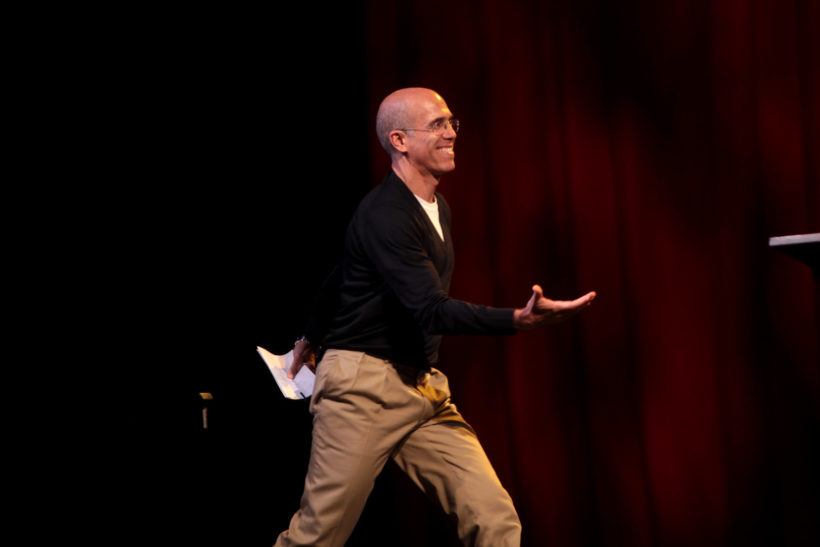
Jeffrey Katzenberg speaking at the 2014 VidCon, Anaheim CC BY-SA 2.0 by Gage Skidmore
The rapid increase in the production of short video forms for mobile terminals is obvious. But most of what we see is user-generated contributions from amateurs. Hollywood producer legend Jeffrey Katzenberg (“Shrek”, “Kung Fu Panda”) now wants to change this with a professional approach (and earn a lot of money with it).
After Katzenberg withdrew from DreamWorks Animation in 2016 and also sold the company to Comcast/NBCUniversal with a personal profit, he already announced major investments in a completely new VoD platform for short films (short form video) in 2017. He initially developed and propagated the project under the name New TV.
The announcement to raise 2 billion US dollars for the project electrified both the industry and Wall Street. The basic idea was to offer an outstanding range of short news videos and professionally produced films up to 10 minutes long exclusively for mobile devices. But it remained for a long time with the announcement and many rumors.
At the beginning of 2018, Katzenberg hit the headlines again with the news that Meg Whitman, one of the most prominent businesswomen in the US economy (former CEO of Hewlett-Packard and eBay), would join the company as CEO of his holding company, which would drive the project forward under the name Quibi (quick bites).
Another year later, Quibi announced that it had raised $1 billion from investors such as Disney, NBCUniversal, Warner, MGM and others. And at the beginning of 2019, CEO Meg Whitman had already paid $100 million in advance to advertising companies. Background: Quibi is to be offered at different subscription prices with and without advertising.
In addition to being limited to short forms exclusively for mobile devices, Quibi differs from YouTube, Netflix, Amazon and other streaming video providers in that it offers high-quality original content from professional and talented filmmakers.
For year one, which begins in April 2020, the company, which already has 160 employees, is to pre-produce content with a budget of $1.1 billion[1]. The initial target includes 7,000 new short film episodes.
Most of the projects will be developed by well-known directors. These include Guillermo del Toro, Sam Raimi, Steven Soderbergh and Katzenberg’s friend Steven Spielberg, who contributes a horror series.
Whether the coup will succeed and Quibi will be successful, as it did before with High Profile animated films by Dreamworks, is of course in the stars. Dreamworks was ultimately no longer profitable with its expensive productions and was overtaken on the market by cheaper productions of illumination.
Katzenberg also had experience with failed projects in the online sector: In 2000, shortly before the planned launch, the streaming project pop.com was stopped, in which Steven Spielberg, among others, was involved and in which Microsoft co-founder Paul Allen personally invested $15 million (i.e. mucked it up with Katzenberg).
It is interesting and instructive to observe the genesis of the project and its future development. It shows how seamlessly the traditional, studio-based film industry can merge into the new digital platform industry. Provided there is – as perhaps only in the USA – sufficient capital and willingness to take risks on the part of the entrepreneurs.
In view of the enormous investment sums and economic power in this sector, some dreams of young short filmmakers to succeed online with cheaply made series and web videos could vanish into thin air. The open global Internet has long been a marketplace like any other and the economic mechanisms of the New Economy hardly differ from those of the Old Economy.
Even if some studio bosses still turn up their noses, the convergence of Hollywood (film/cinema) and Silicon Valley (online/Internet) has long been in progress. Both ‘sides’ are moving in the same direction, as the growing number of festival participations and starts of in-house productions by video-on-demand providers in the cinema shows.
Nor does the long tail theory of the Internet start-up scene (“selling less of more”, Chris Anderson 2004) seem to be fulfilled. In any case, Jeffrey Katzenberg has already revealed his different point of view in 2014. “At the moment,” Katzenberg told the Wall Street Journal, “YouTube earns 95 percent with (qualitatively) lowest level content – unique hits and longtail content. “In 5 years, 95 percent will be paid to the top 5 percent (of producers). Katzenberg itself pays its production partners 20% on top of production costs – up to $6 million per program hour[2] for seven years of exclusive rights.
Quibi starts on April 6th in the USA and Canada with a subscription price of 4.99 $ with and 7.99 $ without advertising, expands to Great Britain and wants to be in Germany in one to two years.
Comparison: Investments in original content from other VoD providers
Netflix — 12 billion $ (2018)
Amazon Prime — 5 billion $ (2018)
Hulu — 2,5 billion $ (2017)
Apple TV+ — 1 – 2 billion $ (2018-2019)
Disney+ — 0,5 billion $ (2019)
Sources (own research): Handelsblatt, Cartoon Brew, Hollywood Reporter, Investor’s Business Daily, State of the Screens, tubefilter, Wall Street Journal, Washington Post, Variety
Picture: Jeffrey Katzenberg speaking at the 2014 VidCon at the Anaheim Convention Center in Anaheim, California; CC BY-SA 2.0 by Gage Skidmore
Bonus comment;-)
David Lynch about movies on the phone: Never, ever …
[1]1,1 billion $ = 986.766.000 € (zum Vergleich: im Jahr 2018 hat die FFA Fördermittel in Höhe von 73,7 Mio. Euro bewilligt
[2] for comparison: One episode of the German crime series “Tatort”, which was criticized as much too expensive, costs 1.6 million €
3 Trackbacks